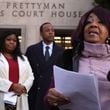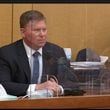“Ode to Grits” By Kevin Young
Like y'all, or sorrows,
or pigsfeet,
or God, your name
always holds multitudes—
is never just one—
unlike moose or deer
or death—which means both many
& alone. Little Lazarus,
you’re the world before
the flood, & what’s after,
are ash turning back
to a body. Done wrong,
you are the flavor
of a communion wafer.
Miss Hominy,
for years I misheard
your name as Harmony
& I was right. Kissing cousin
to Cream of Wheat, godmother
to oatmeal, no one
owns you, much less
no Quaker. Those mornings
over Strawberry Quik
when the kettle called
the Cream of Wheat cook
to meet me for breakfast,
you waited patiently to shine
the whites of your million eyes
on me. You must know
I love you by the way
I like you plain, maybe
buttered up a bit.
Salty, you keep me
on my toes, let me
believe, this once,
in purity—no cheese,
no grape jelly, no Missus
Butterworth’s. Undoctored,
your cloudy stare
unlike my father’s, his one
eye no bullet met
that, hours after he was shot
through the other,
I had to decide to give over
to someone still
alive, some girl or old
man whose vision—
even dead, ever
the healer—my father saved.
Resurrected like you
are daily. Welcome
stranger, pennywise
prophet, you are the wet nurse
of mercy, the rock
water makes speak.
Excerpted from “Blue Laws” by Kevin Young. Copyright © 2016 by Kevin Young. Excerpted by permission of Knopf, a division of Penguin Random House LLC. All rights reserved. No part of this excerpt may be reproduced or reprinted without permission in writing from the publisher.
Kevin Young bobs his head to keep time when he reads his music-fueled poetry. He is no musician, but it appears as if he is playing an instrument as he sways back and forth in front of his audience, tapping his fingers on the lectern in rhythm with his poems.
Music is a central ingredient of the award-winning poet’s work. When he sits down to write a poem at his home in Decatur, songs are usually playing in the background. With an iTunes library of about 35,000 songs, he has a lot to choose from.
That huge catalogue reflects his eclectic taste for blues, jazz, reggae, hip hop, country, rock and punk. So does the voluminous collection of poetry he published this month, “Blue Laws.” At times playful, funny and tragic, it reflects the torrid pace the 45-year-old poet has kept over the last 20 years. Between its covers are about 200 poems from nine books of poetry exploring a broad range of topics: music, food, the Amistad slave rebellion, the late artist Jean-Michel Basquiat, the untimely loss of Young’s father and the birth of his son.
The Emory University professor comes by his love of music honestly. His paternal grandfather performed in a zydeco band. A picture of his fiddle is on the light blue cover of Young’s new book. Young’s father was also a music lover. The poet fondly recalls listening with his dad to Bob Marley, the Gap Band and Earth, Wind & Fire.
“I feel music is another kind of literature,” Young said over lunch recently at Victory Sandwich Bar in Decatur, where he lives with his wife, Kate Tuttle, a book columnist for The Boston Globe, and their 9-year-old son, Mack.
“It is another way of talking about pain and love. Great music — say jazz — has that inventive, improvisational quality that tells us something about life. I think it is Ralph Ellison who said life is jazz-shaped. And that kind of idea — that jazz really mirrors the way we live — is important to me.”
The son of an ophthalmologist and a chemist from Louisiana, Young moved six times before he was 10 as his parents pursued their careers. He has lived in Kansas, Illinois, Massachusetts and New York, among other places. While attending Harvard University, he studied under poets Seamus Heaney and Lucie Brock-Broido and joined the Dark Room Collective, a group of black writers that included fellow poet Natasha Trethewey, also a professor at Emory.
Young taught poetry at the University of Georgia and Indiana University before moving to Emory, where he is the curator of Literary Collections and the Raymond Danowski Poetry Library. His collection of essays, “The Grey Album: On the Blackness of Blackness,” won the PEN Open Book Award. And his poetry collection “Jelly Roll: A Blues” was a finalist for the National Book Award.
Blues in particular is an inspiration for Young. He connects it to the tragicomic writing of Langston Hughes, the author of the short story collection, “Laughing to Keep from Crying.”
“I came to really appreciate the way that he was the first in poetry to take the blues form and use it in poetry,” Young said. “He was trying to lend the blues’ nobility to poetry and its directness and its understatedness and its hyperbole — the way it can sort of use all the irony that is there to make us laugh and think about sorrow in a new way and think about injustice. And those are some of the things the blues do for me.”
One of the poems in “Blue Laws” shows his broad appetite for music while highlighting that he grew up in the ’80s. Named after a sorrowful hit song written by The Smiths, “There is a Light That Never Goes Out” is compilation of song titles from that decade: “Don’t You Want Me,” The Human League; “Every Breath You Take,” The Police; “Thriller,” Michael Jackson; “Let’s Dance,” David Bowie; and “Let’s Go Crazy,” Prince.
There are also more serious pieces in the book, like his poem about the death of his father, “Bereavement.” It tells the story through a pair of beloved dogs that were left behind after his father was killed in a hunting accident. Young’s pain is palpable in the piece.
They do not bark.
Do they know he is dead?
They wag their tails
& head. They beg
& are fed.
Their grief is colossal
& forgetful.
Each day they wake
seeking his voice,
their names.
Amid the darkness in this poem is a flash of humor, something not uncommon in Young’s work:
I’ve begun to think of them
as my father’s other sons,
as kin. Brothers-in-paw.
The play on words is Langston Hughes-like tragicomedy for Young.
“There was a moment when I thought, ‘Well, I have these little humor things. Should I take them out?’” he said. “And I thought it wouldn’t be true to the experience, which is there is an absurdist kind of humor… just that feeling of losing someone. Your whole world changes. But then you sort of have to stand around and say, ‘What the heck is happening?’”
His voice edged with emotion, Young read “Bereavement” during his book launch event at the Carter Presidential Library & Museum in Atlanta this month. About 40 fans – young and old and black and white – filled the brown upholstered seats in the theater. His wife sat in the front row, her eyes fixed on him.
Wearing blue jeans and a gray jacket with a bright pink handkerchief flowering out of his breast pocket, Young stood behind a lectern in front of a long purple curtain and read another fan-favorite, “Crowning.” About the birth of his son, the vivid poem puts the reader in the delivery room with him and his wife. He said she was the hero of the piece, eliciting laughter from the audience. And then he began reading:
she squeezing my hand, her face
full of fire, then groaning your face
out like a flower, blood-bloom,
crocused into air, shoulders
and the long cord still rooting
you to each other, to the other
world, into this afterlife
His fans sat rapt with attention. Then there was a burst of enthusiastic applause at the end.
He chose not to read the last poem in his collection, “Book of Hours,” because it is much longer. A sweeping piece about life and death, it ends on a promising note as a storm is lifting up some leaves: “Why not sing.” It’s a statement, not a question.
“You sing because of how life is,” said Young, “but you also sing despite it sometimes. That is the blues in many ways, isn’t it?”
About the Author






